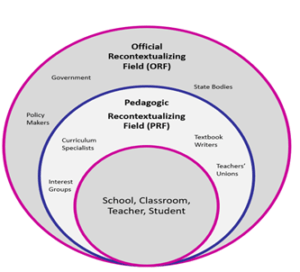Team: Joan Costello – PhD Researcher, Dr Orla McCormack, Senior Lecturer in Education, School of Education, Education and Health Sciences (EHS), University of Limerick (UL) – Principal Investigator, Dr Sarah Hayes, Chief Operating Officer, SSPC. EPI*STEM, (UL) – PhD Supervisor, Dr Merrilyn Goos, formerly of the School of Education, Education and Health Sciences (EHS), and EPI*STEM, (UL) – former Principal Investigator.
The project and research
Secondary school participation in Science, Technology, Engineering and Mathematics, and aspirations to STEM careers, are patterned along gender, class, ethnicity and identity lines. The curriculum forms part of a joined-up approach to widening STEM participation, however, the curriculum is not systemically included in initiatives promoting STEM. Yet, the curriculum is a tool for enacting inclusion and equitable education where systems of inclusion and exclusion are considered. This research examines the transformation of original knowledge, e.g. physics, into pedagogic discourse, e.g. school physics. Competing interests, ideologies and the objectives of the stakeholders involved in the recontextualization process, shape the curriculum and students are socialised through the norms it transmits. This means the curriculum can sustain inequitable patterns or represent the interests of traditionally excluded groups.
Using a lens of diversity and inclusion and focusing on the macro and meso levels of curriculum development, the research involves interviewing individuals from the STEM curricula development and selection fields, as well as the analysis of secondary data such as 21 textbooks across the four subjects.

Using the grounds of Ireland’s equality legislation as the analytical framework for the textbook analysis, the following themes were identified from the analysis of eight science textbooks: Please note these results are provisional as the research is ongoing.
Dominant representations
- White men are the dominant representation in the books
- White people are most likely to be represented engaged in scientific work
- Famous or well-known individuals are predominantly White
- Professional workers, the highest CSO class, are most represented within books
Absence of representation
- The Traveller Community
- Famous Black women / Women of colour and famous women with Asian heritage
Limited Representation
- Famous Black men, Famous Asian heritage men
- People living with disability
- LGBTQIA+
Stereotypes
- Potential stereotypes exist within books e.g. viewing Black people as athletic not intellectual.
Binary Representations
- Gender is mostly binary.
- Gender neutral is represented through the use of a singular noun and a traditionally plural pronoun.
Impact
Through education and public engagement, we seek to foster and nourish STEM interest and participation by traditionally underrepresented voices. By engaging with curriculum makers, and the downstream impact of this engagement on students, the research has the potential to broaden the pool of students who see STEM as being for them, in terms of study and careers, as well as the potential to produce a more STEM literate society.
Curriculum makers are not typically targeted with EPE initiatives. The provisional findings suggest there are challenges around how diversity and inclusion are reflected within the curriculum, therefore, by exploring the values that inform STEM curricula development and selection in the Junior Cycle, this research has the potential to inform future STEM curricula development to produce a more diverse and inclusive curriculum.
For students, the textbook is the curriculum and students are socialized through the norms it transmits. For traditionally underrepresented students, seeing themselves within the textbooks, depicted within STEM arenas and activities, has societal implications. Therefore, in addition to broadening the pool of students who see STEM as being for them, the research also has the potential to produce a more STEM literate society.
The provisional research results were presented at the ESAI Curriculum Studies Special Interest Group Conference, held at the DCU All Hallows Campus in June 2023. The theme of the event was “Mapping the Field of Curriculum Studies Research in Ireland”. The presentation won one of two bursary awards given to the best presentation / poster.
The research has featured in poster sessions at the 2022 SSPC Symposium and the Shannon Region Postgraduate Research Conference. The research was featured as part of SSPC’s eight year review process.
Research References:
Archer, L., Moote, J., MacLeod, E., Francis, B. and DeWitt, J. (2020) ASPIRES 2: Young people’s science and career aspirations, age 10-19, London: UCL Institute of Education
STEM Education Review Group (2016) STEM Education in the Irish School System. A Report on Science, Technology, Engineering and Mathematics (STEM) Education, Dublin: STEM Education Review Group
European Schoolnet (2018) Science, Technology, Engineering and Mathematics Education Policies in Europe. Scientix Observatory report., Brussels
IBE (2008) ‘Inclusive Education: The Way of the Future. Paper for International Conference on Education.’, in International Conference on Education, Geneva, Switzerland, 25–28 November
Forgasz, H. and Rivera, F. (2012) Towards Equity in Mathematics Education: Gender, Culture, and Diversity, Heidelberg: Springer-Verlag.
Bernstein, B. (2000) Pedagogy, Symbolic Control and Identity: Theory, Research and Critique, Maryland: Rowman & Littlefield.
Pizzini, E.L., Shepardson, D.P. and Abell, S.K. (1992) ‘The Questioning Level of Select Middle School Science Textbooks‘, School science and mathematics, 92(2), 74-79.
UNESCO (2020) Global Education Monitoring Report. Inclusion and Education: All Means All, Paris: United Nations Educational, Scientific and Cultural Organization
















